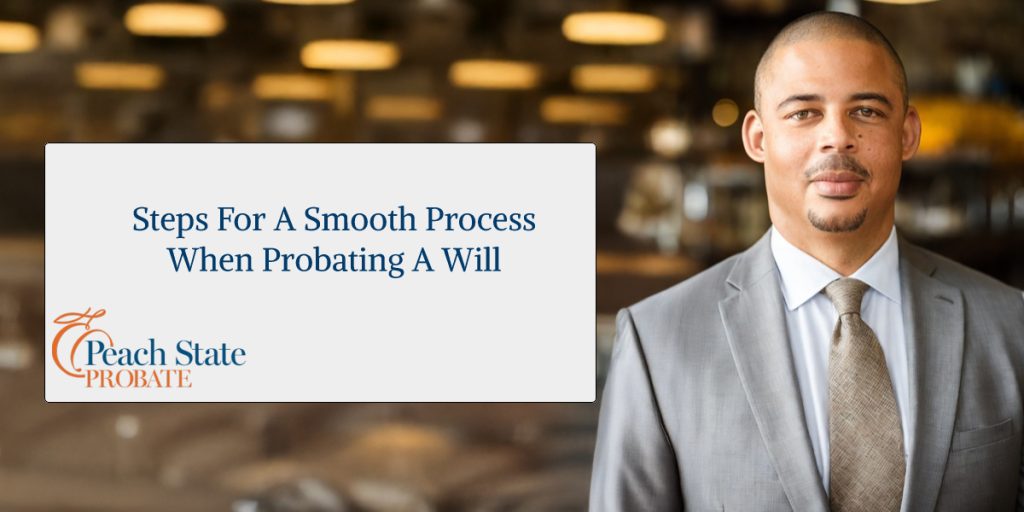## Navigating the Process of Probating a Will
Probating a will is a critical step in ensuring that a deceased person’s wishes are honored and their estate is distributed according to their preferences. This legal process involves validating the will, settling debts, paying taxes, and distributing assets to beneficiaries. It is important for executors and beneficiaries to understand the complexities involved in probating a will to facilitate a smoother experience during what is often a difficult time.
The probate process can differ significantly depending on various factors, including the size and complexity of the estate, whether disputes arise among beneficiaries, and the specific laws that govern probating a will in Georgia. Awareness of these factors and their potential implications can help individuals navigate through this process with greater ease.
The importance of being proactive and informed cannot be overstated when it comes to probating a will. Understanding the legal framework, potential challenges, and available resources will equip individuals to deal effectively with the probate process and ensure that the wishes of the decedent are fulfilled.
## What Constitutes Probating a Will?
Probating a will is the legal process through which a deceased individual’s will is validated in a court of law. The probate process starts with the petitioning of the court to recognize the will as the official document that outlines the decedent’s wishes regarding their estate. This includes the identification of the executor and the verification of the will’s authenticity.
Once the court accepts the will, it is essential to inform all potential beneficiaries and heirs, as they have rights in the probate process. In Georgia, this communication serves to prevent future legal disputes regarding the estate and ensures that all interested parties have the opportunity to make claims or voice concerns during the probate proceedings.
In many instances, probating a will also involves the administration of the estate, where the executor settles debts, files tax returns, and ultimately distributes the remaining assets. This administrative role requires attention to detail and compliance with state laws to ensure that the process is conducted fairly and legally.
## The Significance of Understanding Probating a Will
Understanding the nuances and importance of probating a will holds significant value for both executors and beneficiaries. At its core, this process not only honors the deceased’s intentions but also provides a structured way to settle an estate. It is crucial for all parties involved to be aware of their rights and responsibilities from the outset.
The implications of probating a will extend beyond just appointing an executor and distributing assets; they may also include tax liabilities, settling debts, and handling disputes among heirs. Understanding these critical elements allows executors to prepare for potential challenges along the way and helps beneficiaries understand what to expect.
Furthermore, knowing the significance of the probate process fosters better communication and cooperation among family members during a challenging time. By understanding the legal landscape, unaffected parties are less likely to engage in conflicts over assets, leading to a more harmonious resolution of the estate.
## Legal Context of Probating a Will in Georgia
The legal framework governing probating a will varies from state to state, and Georgia has specific laws that must be followed throughout the probate process. Understanding these laws is essential for executors and beneficiaries as they directly affect the timeline, costs, and procedural requirements involved. Each county in Georgia may have its own probate court that manages the probate process, and it is essential to be aware of local rules and customs.
In Georgia, if a will is deemed valid and admissible to probate, it must be proved in court, typically accompanied by a completed application and the necessary witness signatures from the original will. The requirements for validity include being at least 14 years old, signing the will, and having two witnesses present during its execution. Familiarity with these standards can help prevent unnecessary delays in the probate process.
Additionally, certain estates may qualify for a simplified probate process under Georgia law, which can significantly expedite the proceedings and reduce the expenses associated with traditional probate cases. Executors should be prepared to assess whether their loved one’s estate meets these criteria to navigate the process more smoothly.
## Real-World Applications of Probating a Will
Real-world examples provide valuable insights into how probating a will plays out in various situations. Each case is unique, influenced by family dynamics, the size of the estate, and the specific wishes outlined in the will. For instance, a straightforward case may involve a single property and minimal assets, allowing for a streamlined probate process. In such scenarios, executors can efficiently fulfill the decedent’s wishes with minimal complications.
Conversely, complex cases involving blended families, numerous assets, or significant debts often lead to disputes among beneficiaries. In one real-world case, siblings found themselves in disagreement over the interpretation of their deceased parent’s will. This situation necessitated the intervention of the probate court to mediate, illustrating how disputes can complicate the process and, at times, delay the distribution of assets.
Moreover, probating a will can also uncover hidden assets or complicated financial issues that require addressing. Executors may need to conduct thorough investigations to ensure that all debts are settled and all assets accounted for before distribution. Understanding the potential challenges by examining these real-world applications prepares executors and beneficiaries for any surprises that may lie ahead.
## Proactive Steps for Successful Probate Administration
Taking proactive steps can significantly enhance the experience of probating a will. One of the first steps involves gathering all relevant documents, including the original will, any amendments, and a comprehensive list of the deceased’s assets and debts. Proper documentation is crucial as it ensures that all pertinent information is readily accessible throughout the probate process.
Additionally, establishing clear lines of communication with all beneficiaries can prevent misunderstandings and disputes. Open discussions about the estate’s administration, expectations, and timelines can go a long way in fostering a cooperative environment. Beneficiaries should feel informed and involved, allowing for a smoother process overall.
Lastly, staying organized and adhering to deadlines is integral to a successful probate administration. Executors need to keep track of critical dates, such as the deadline for filing the will and the timeframe for submitting tax returns. Attention to detail and organization can help ensure that all aspects of the probate process are addressed promptly and efficiently.
## Common Pitfalls in the Probate Process
While understanding the process of probating a will can help facilitate a smooth experience, there are common mistakes that individuals often make. One significant error is failing to notify all interested parties in a timely manner. In Georgia, beneficiaries and potential heirs must be informed about the probate and any pending actions concerning the estate. Neglecting this can lead to legal complications and disputes down the line.
Another common pitfall is the underestimation of the estate’s liabilities. Executors must understand the totality of the decedent’s debts, including mortgages, credit card balances, and any pending taxes. Failure to accurately assess these liabilities may lead to unexpected financial burdens for the estate and could hinder the probate process.
Additionally, executors should avoid taking actions that could be perceived as self-serving or biased toward certain beneficiaries. These actions can lead to accusations of misconduct and potentially result in lengthy court battles. By remaining impartial and transparent, executors can navigate the probate process with greater success and maintain family harmony.
## When It’s Best to Consult an Attorney
Although some individuals may attempt to navigate the probate process independently, there are various scenarios where it is wise to consult an attorney. Situations involving large or complex estates are often beyond the knowledge and experience of individuals without a legal background. Attorneys specializing in probate law can provide the necessary guidance to navigate the intricacies of estate laws effectively.
Moreover, if disputes arise among beneficiaries or interested parties, professional legal assistance can be invaluable in mediating these conflicts. Having an attorney involved not only helps to ensure that the decedent’s wishes are honored but also maintains family relationships by providing a neutral third party to facilitate dialogue and resolution.
Another reason to seek legal counsel is the filing of the will or petition in a court. A minor error during filing can lead to delays or rejections, which could complicate matters further. An attorney can ensure that all paperwork is correctly completed and filed on time, avoiding unnecessary complications.
## Advantages of Having Legal Representation
The benefits of legal representation during the probate process extend far beyond mere guidance; they encompass an array of advantages that enhance both efficiency and security. One primary benefit is expert navigation through the complex legal landscape of probate law, ensuring compliance with local regulations and timelines. This knowledge can save executors and beneficiaries significant time and reduce the risk of costly mistakes.
Legal representation also provides peace of mind during a challenging time. Executors may face emotional stress while dealing with the loss of a loved one and managing their responsibilities. Engaging a probate attorney allows them to focus on their grief and family while knowing that a professional is overseeing the legal aspects of the process.
Additionally, having an attorney can help protect the interests of the beneficiaries. In cases where disputes arise or allegations of misconduct are made, an attorney can advocate on behalf of the beneficiaries and ensure that legitimate claims are addressed properly. This protection ensures that the administration remains fair and within the bounds of the law, providing reassurance to all parties involved.
## How Peach State Probate Facilitates a Seamless Probate Process
Peach State Probate stands out in Georgia as a premier choice for navigating the complexities involved in probating a will. Their dedicated team possesses a comprehensive understanding of the probate laws in Georgia and is committed to providing exceptional service to clients during a challenging period. This focus allows them to deliver personalized strategies based on individual needs and circumstances.
One of the distinguishing features of Peach State Probate is their holistic approach. They not only engage in the legal intricacies of probating a will but also prioritize emotional support for their clients. This dual approach fosters trust and open communication, creating an environment where families can feel secure knowing their loved one’s wishes are being honored with care and diligence.
Moreover, Peach State Probate’s reputation for excellence in client satisfaction reflects their commitment to quality representation. By handling all aspects of the probate process, from documentation to court proceedings, they provide clients with peace of mind, knowing that a capable team is managing the intricacies of their loved one’s estate.




